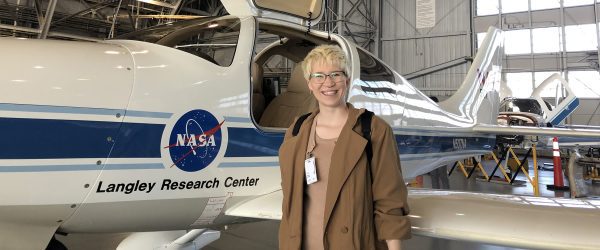Cleared for launch: Education student elevates skills with NASA training

The halls of the NASA Langley Research Center are usually filled with leading researchers and top engineers, working on projects related to aeronautics and exploration. However, on one day each year, bright aspiring teachers fill the oldest NASA field center as honored guests. Parks Drake, a student in the UNC Charlotte Cato College of Education, toured the center this year, as one of only 13 students in North Carolina to be awarded the STEM Pre-Service Teacher Education Scholarship.
Funded by the North Carolina Space Grant, the scholarship supports undergraduate and graduate students as they gain teaching experience, and it promotes education in science, technology, engineering and mathematics (STEM) by developing student-teachers’ understanding of NASA research and equipping them with teaching strategies for students of all ages.
“I applied for the NASA scholarship because it was an opportunity to build my knowledge, spark my own curiosity and bring resources into my student-teaching classroom and to my students in the future,” said Drake.
As a STEM teacher-in-training, Drake completed three NASA Modules for Educators that provided resources and best practices for teaching STEM concepts. Through these modules, she learned about aeronautics and created an interactive lesson for her student-teaching classroom that incorporated the history of flight and the use of wind tunnels. In her classroom, students actively engaged in conducting an experiment that blew wind at different speeds to understand how NASA engineers test different variables for flight.
“I found it to be a great visual for students who were at different levels and provided an element of movement when connecting new vocabulary to the lesson,” said Drake. “I loved how many of my students who have never had the opportunity to engage in topics like these seemed to truly enjoy it.”
During her visit to NASA Langley Research Center, Drake presented this teaching lesson. While touring the facility, she also delivered handwritten notes from her students to NASA researchers. One of her students received a letter in response from NASA, which sparked a great deal of enthusiasm in her fourth-grade classroom.
“This meant so much to the students because of the impact it made and the excitement the students felt,” said Drake. “Because of this scholarship, I was reminded of why I want to be a teacher and how we as teachers can create special learning opportunities for all students.”
Drake expects to graduate this fall with a bachelor’s degree in elementary education. She plans to pursue a career as a teacher and is interested in continuing her education in graduate school.